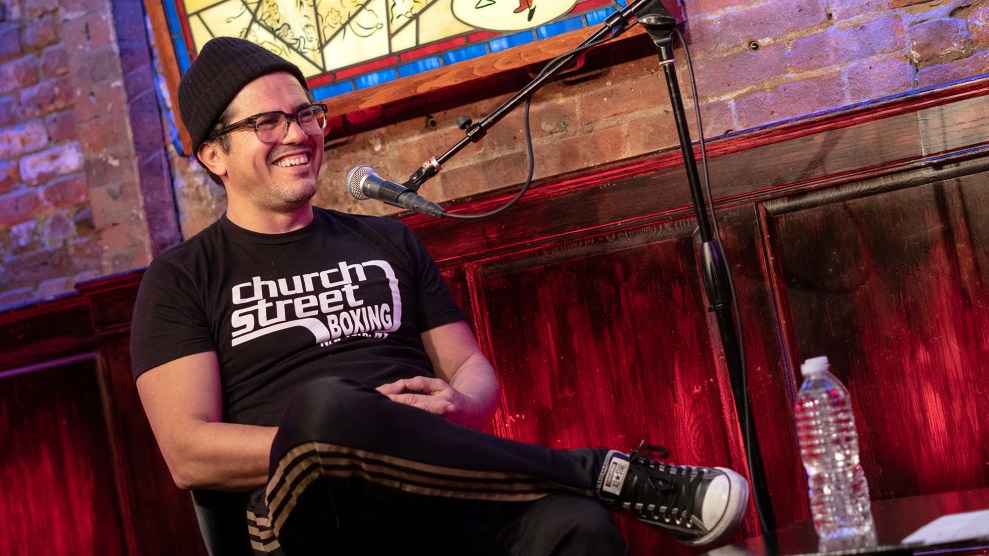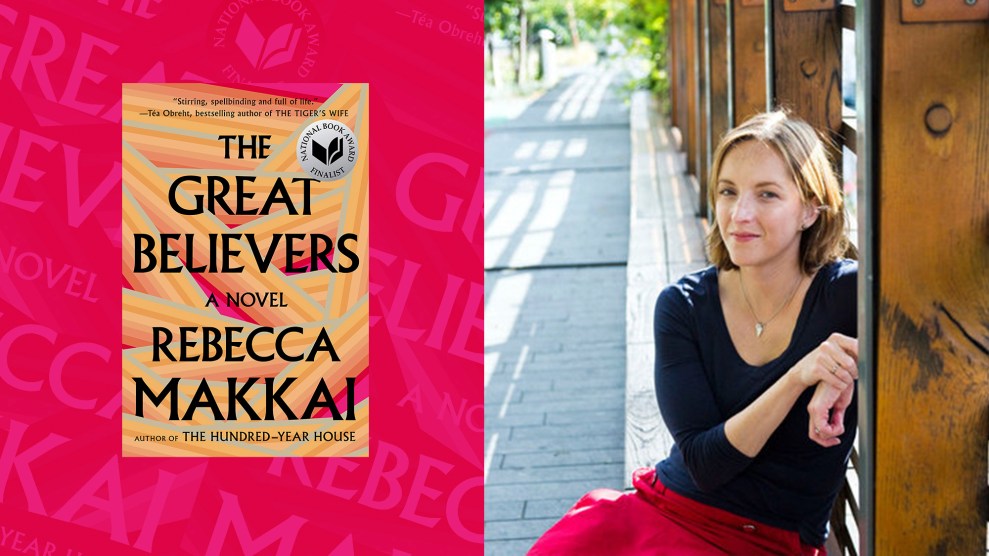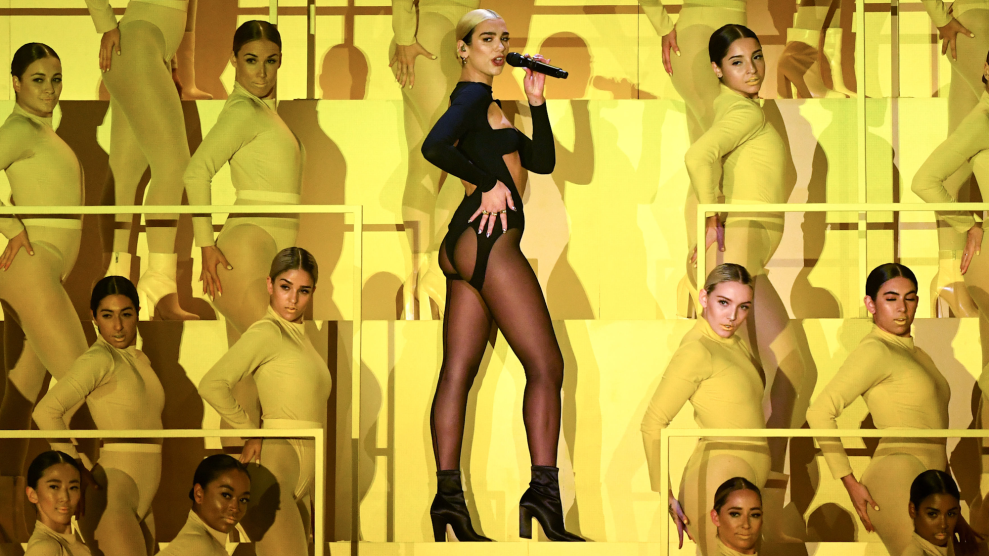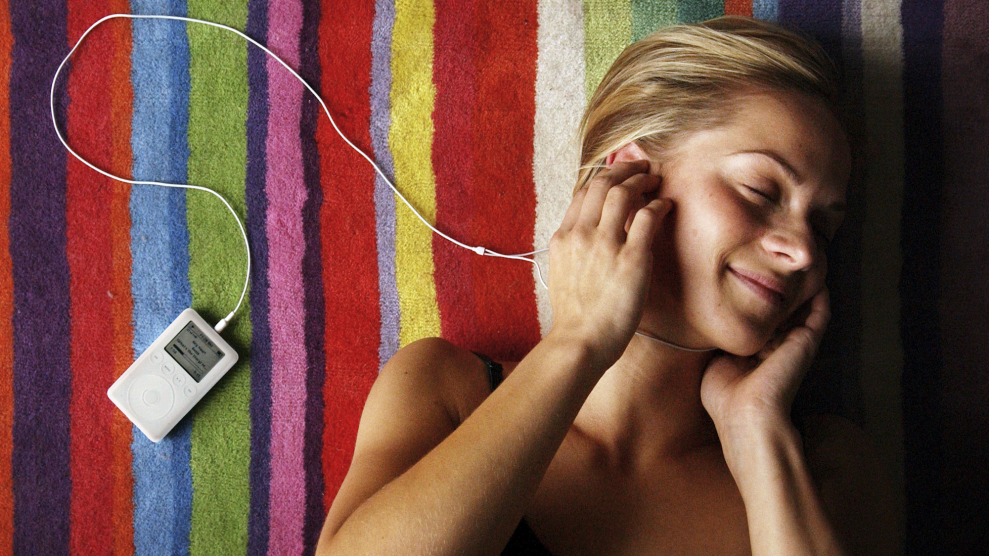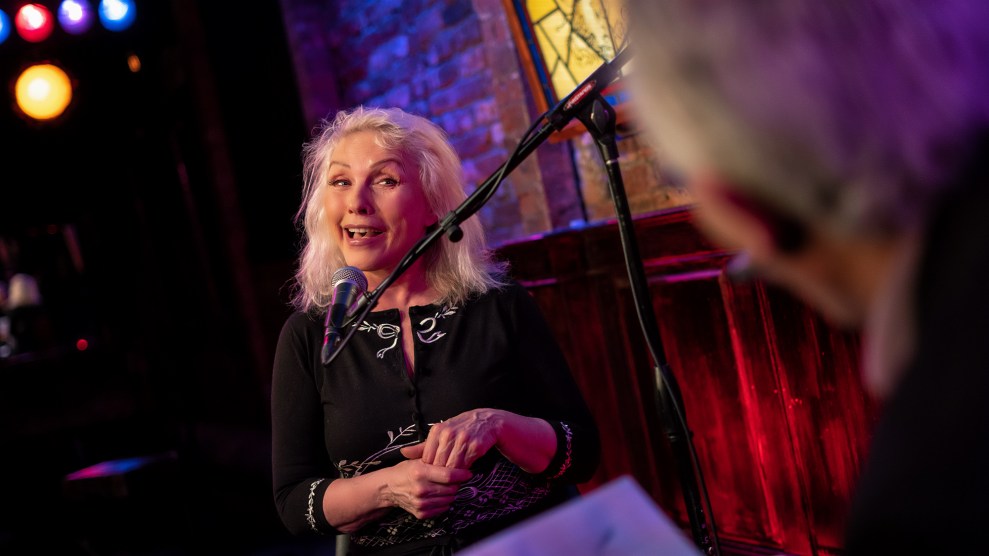
Rock star Debbie Harry, talking with Mother Jones' David Corn, onstage at New York City's Comedy Cellar in January 2020.Mark Helenowski/Mother Jones
Debbie Harry, icon, is worried about bees.
“I have a couple of hives,” the Blondie frontwoman says. “But mostly, I feel like I’m a spokesperson.” The plight of the honeybee and its perilous population collapse—a “fundamental issue,” Harry warns—requires a high-profile advocate, and who better than this original punk rocker. At this stage in her storied career, Harry finds “tremendous satisfaction” in lending her name and credibility to the bee. It’s simple: When fans discover her activism, bees get attention. “It’s a chain reaction,” she says—a cause that “charges itself.”
Her work with bees, and with New York conservation group River Keeper, helps more than just the environment. This activism, she says, “helps give a bigger sense of consciousness to people, but also really gives me a sense of purpose.”
Harry shared these insights back in January when she sat down for a lengthy chat with Mother Jones Washington Bureau Chief David Corn at New York City’s historic stand-up venue, the Comedy Cellar. It was just a few months after her memoir Face It came out, and she opened up about bees, yes, but also her rise through a male-dominated music world, her relationship with David Bowie, how to avoid being an asshole, and even her assessment of modern architecture.
Recorded as part of a new podcast series that was in the early stages of co-production before the pandemic hit, this interview is finding a new home on the Mother Jones Podcast. Last week, listeners heard from actor and activist John Leguizamo on the whitewashing of Latinx history by Hollywood executives and the New York Times; next week, TV host Samantha Bee completes this limited summer series, which was co-produced by the Comedy Cellar and Mother Jones.
Below is a transcript of some of the interview’s highlights, edited for length and clarity.
On sexual harassment and sexism in the music industry.
I had my fair share, but I think by [the time I was famous] I was probably used to it, and it seemed to be the way things were. It certainly wasn’t open for discussion. Some of us sort of laughed it off, and some of us became man-haters. I will say that having my great friend and partner, [Blondie bandmate] Chris Stein, was tremendous support. In many ways, Chris and I would talk about things and figure out our plan of action and so forth. But he would be the “presenter,” he would be the front. And I was—was he the beard, and I was in the back? Was I wearing a beard? I don’t know. Or was he wearing a beard? Who knows. Somebody was wearing a beard.
On the “Blondie” character.
It was a bold statement. I don’t think that I would have ever walked around the streets in such a provocative way, having had my experience of being under the aggressive impulse of certain guys. My real natural instinct was to portray the women that influenced and inspired me, which was very cinematic, the blonde cinematic goddess, and to bring that to the front of a band was a different approach. So that to my mind was the uniqueness of Blondie.
On the challenges of criticism.
When you’re waiting to go on stage, you’re amped up and you’re excited and you’re maybe scared; all of these things are going through your mind, you have a job to do. What are these people going to think? Your mind is going really fast. So when you get out there, it’s this tremendous rush, adrenaline, and all of the accompanying glandular responses, and then that sort of takes care of itself, and you’re working and you’re listening and you’re trying to get your ideas across.
I wouldn’t read criticism or press, for that very reason. Suddenly, I would be in the midst of something on stage and something would come floating through, some criticism or some remark, and I would completely lose my place. I would become completely distracted, disheartened. And that’s one of the things that I learned that I had to avoid, getting my head full of what other people were saying.
I’m much happier when I’m working. I don’t know about you, but I’m much happier. I think my torment comes from feeling maybe I’m not good enough at what I do and I would like to be better. Because I know geniuses. I know people that are really genius and I know that I’m not a genius, but I would love to be one. Then I wouldn’t have to think so much.
On how to avoid being an asshole.
I think one of the things that sort of saved me from being a complete asshole was that I started a little bit later in life, and I had tried other things and I knew what hard work was. As a kid, I was sort of beaten about the head a little bit by my family, to not be such a poser. I guess I had a good upbringing.
On making counter-culture mainstream.
That was very much what was happening in the early days of the British explosion, that a lot of the musicians came from the art scene, from the art schools. Chris definitely came from that. I was aspiring to that. I was very attracted and interested. When I first came to the city, most of the people that I knew and that I hung out with lived below Canal Street in those big lofts, and they were doing big paintings and sculptures and weird stuff. And there were all these happenings. Just crazy stuff that went on for like 48 hours. And you’d just be tripped out of your brain and people would be jumping around and playing weird music. That was kind of great. It was just no holds barred, basically.
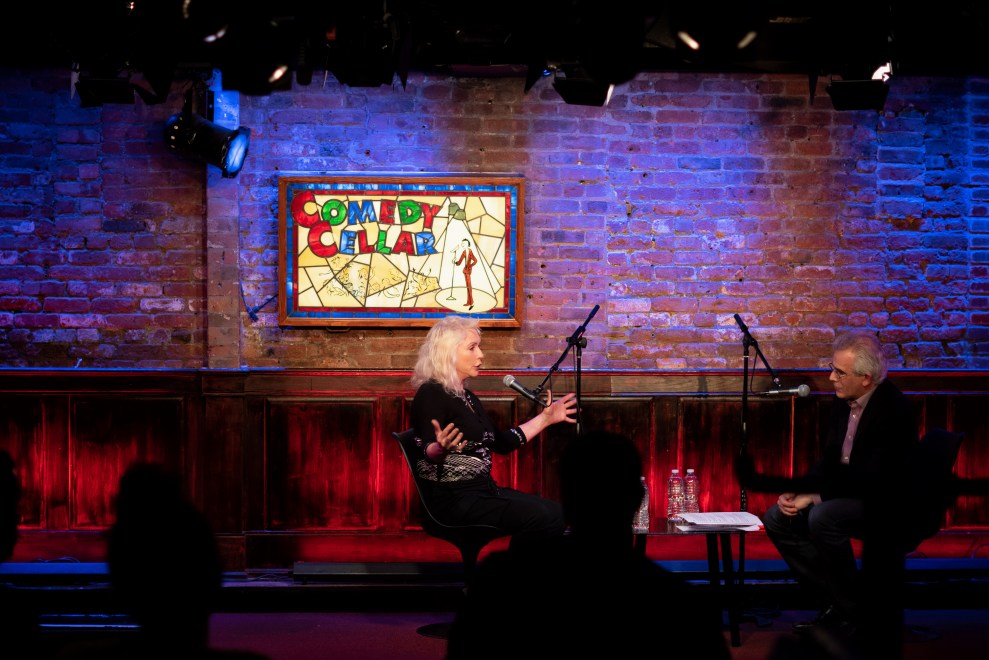
On her favorite Blondie songs.
Well, I don’t have a list in front of me and I don’t have that kind of brain.
You see, there was a period of time when Chris and I were together and there were solo albums that are really hard to find and totally unavailable. Those albums are things that Chris and I collaborated on. Some of those are my favorite songs. Oh, god, “In Love With Love” was a great song. Chris wrote the music, too.
But the Blondie songs that really hold up for me are of course “Rapture” and “Heart of Glass.”
I think that Pollinator [in 2017] was one of our best albums. In this country, it didn’t really make a dent. We did better with it outside of the states, which seems to be pretty much the Blondie story. Again, with this release, we were not really getting a super, super, super big push from a label. And I think that those early Blondie albums, we were really, really getting a very concentrated push from our label. So that makes a big difference and the industry did change. It’s very funny, in a way: I think music lasts longer now, because it’s always available and people can find it easily.
On what she listens to now.
Up until recently, I was exploring ’90s grunge, which I sort of somehow didn’t really get into so much. I’m drawing that to a conclusion, but I’m trying to pay attention to some new stuff. It’s always interesting, to see what evolves. Somehow I skipped the ’90s. I don’t know why. Drugs, I suppose.
On David Bowie.
We all admired him so much and he was truly an artist. He did experiment and he did do things that people questioned and didn’t always admire. In retrospect, they do. It’s become a full picture of this man as an artist. He was smooth; he was the Thin White Duke. He was flirtatious but a gentleman at the same time. I don’t think he would have ever had a hashtag applied to him. Bowie was truly an artist. He evolved, but as a solo artist in a slightly sort of different way. I think he needed to have that kind of control.
On the mall-ification of New York City.
There are many, many other cities in the world that have created malls out of different areas of their metropoles. But I think that the only thing that annoys me about New York is that the beauty of the minimalist, old fashioned architecture, it’s just destroyed. There’s a way to save a facade of a building, even though it might not be the most perfect, or the most beautiful, or the most architectural, or the most uptown experience. But the look of these facades lined up in a row, and then behind them, are bigger structures, more modern structures. But the “street look,” that “curb appeal” is preserved. That’s quite wonderful and quite beautiful. So I object to the fact that the people that do this, these contractors and developers, haven’t got a clue about what really makes something happen.
One of the things that really disturbs me is not in Manhattan, but it’s in Atlantic City. Atlantic City was a quite wonderful place before the turn of the century, with this wonderful boardwalk and these old mansions that line the front, the boardwalk, on the seaside. Those things made Atlantic City important and wonderful and what it was, and in more modern times, all that stuff’s been knocked out. Those facades could have been incorporated with these bigger structures behind them, to preserve that curb appeal, that boardwalk, that sensibility, that atmosphere. Why can’t we do that? Why haven’t we done that?
On bees.
I originally was involved with the group called Riverkeeper. So I was very involved in water. We can’t live without it. It just became apparent to me that water was an issue for the future. And then, I guess in the last five years, I started reading about the loss of honeybees and different pollinators in how the population was decreasing to a really dangerous level. So I thought, well, okay, here’s another real fundamental issue.
There’s so many things that you can become involved with, they’re important to humanity. And at this stage of my life, in my career, it gives you consciousness, a bigger sense of consciousness to people, but it also really gives me a sense of purpose, I guess, bigger sense of purpose.
I have a couple of hives. But mostly I feel like I’m a spokesperson. People look at me and they find out that I’m interested in something and they go, “Oh!” And then the other thing is, with the honeybees, I am amazed at how many people, how many fans have said to me, “Oh, my dad had bees. I know how to do that.” And it’s just a sort of ongoing, it charges itself. It’s one of those things. It’s a chain reaction.
On “giving back” through activism.
I think it really gives me a tremendous amount of satisfaction, and a real positive energy, that I’m contributing and perhaps giving back. I’m lucky and I know that I’m lucky. I know that I’ve been given a really special life. I know from when I was struggling, when I didn’t have any money, how hard life can be and how difficult; people are trying to raise children, and just survive and pay the rent. I know how hard it is and how disgusted you get and frustrated and fearful about environmental issues. But if somebody says, okay, put your paper in a separate pile from your wet garbage, and you do a small amount of recycling, well, I am trying to do something positive and it distracts you a little bit from your dilemmas. It’s a contribution, it sets you aside. It gives you a little breathing space in your brain. And maybe in your heart.

